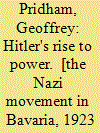|
|
|
Sort Order |
|
|
|
Items / Page
|
|
|
|
|
|
|
| Srl | Item |
| 1 |
ID:
064406


|
|
|
|
|
| Publication |
Hampshire, Palgrave Macmillan, 2005.
|
| Description |
ix, 284p.
|
| Standard Number |
1403903182
|
|
|
|
|
|
|
|
|
|
|
|
Copies: C:1/I:0,R:0,Q:0
Circulation
| Accession# | Call# | Current Location | Status | Policy | Location |
| 049848 | 320.94097171709049/PRI 049848 | Main | On Shelf | General | |
|
|
|
|
| 2 |
ID:
135301


|
|
|
|
|
| Summary/Abstract |
The European Union has a unique opportunity to develop a positive strategy towards Ukraine. A pro-EU government is now in power in Kyiv, there is a revived civil society pressing for democratic reforms and the actions by Russia have both reinforced Ukraine’s pro-West line and led to the priority given Moscow being questioned by some member states. It is therefore essential to grant Ukraine a membership perspective to strengthen this trend and encourage Kyiv to confront and overcome the basic problems that face the country.
|
|
|
|
|
|
|
|
|
|
|
|
|
|
|
|
| 3 |
ID:
027795


|
|
|
|
|
| Publication |
London, Hart-Davis, MacGibbon, 1973.
|
| Description |
xvi, 380p.hbk
|
| Standard Number |
0246105178
|
|
|
|
|
|
|
|
|
|
|
|
Copies: C:1/I:0,R:0,Q:0
Circulation
| Accession# | Call# | Current Location | Status | Policy | Location |
| 015565 | 943.085/PRI 015565 | Main | On Shelf | General | |
|
|
|
|
| 4 |
ID:
086238


|
|
|
|
|
| Publication |
2009.
|
| Summary/Abstract |
The state of democracy in post-communist Europe has been subject to some debate in recent years; but it needs to take account of longer-term trends. The focus here is on how far the EU's political conditionality has contributed to democratic consolidation using an in-depth case study of post-Soviet Latvia. The record of the impacts of conditionality up to EU entry is examined and then attention turns to whether post-accession tendencies have demonstrated any significant changes after the end of Brussels' monitoring. Using a comparative framework, this article shows that the outcome after four years of EU membership is mixed with both positive and negative results. It is concluded that there is no automatic locking-in effect of European integration; and that conditionality assists democratic consolidation more in structural than in attitudinal or behavioural terms.
|
|
|
|
|
|
|
|
|
|
|
|
|
|
|
|
| 5 |
ID:
082095


|
|
|
|
|
| Publication |
2008.
|
| Summary/Abstract |
The EU's political conditions have been a consistent and at times salient element in the accession process, since Brussels enlarged their scope and tightened procedures from the mid-1990s. But so far little attention has been given to post-accession compliance with these conditions. This is important, for while the European Commission no longer monitors them, the political conditions were imperfectly implemented by the time of the 2004 enlargement. The question that therefore arises is whether compliance continues or whether there are any tendencies to reverse the process. Using a comparative approach based on four alternative hypotheses, this problem is explored in detail using the case of Slovakia, a country where the EU has been a prominent factor in its return to the path of democratisation after the Meiar years. Comparing Slovakia's performance on the EU political conditions before EU entry in 2004 and during the three years after, two competing approaches, 'rationalist' and 'constructivist', are assessed. It is found that the fears of the rationalists have not been strongly justified nor have the hopes of the constructivists been much encouraged. The outcome of political conditionality is related to democratic consolidation in Slovakia, and the conclusion is that the former assisted the latter despite its limitations but much more with respect to reforming institutions than to changing either attitudes or behaviour.
* This article draws on the author's work for an ESRC Fellowship for 2004 - 2007 on 'Europeanising Democratisation?: EU Accession and Post-Communist Politics in Slovakia, Latvia and Romania'. During this fellowship, three fieldwork visits to Slovakia were made in March 2004, May 2005 and September 2006, when altogether 85 elite interviews were conducted. It also, where necessary, draws on previous fieldwork there from 1995 including 107 elite interviews in Bratislava.
|
|
|
|
|
|
|
|
|
|
|
|
|
|
|
|
|
|
|
|
|